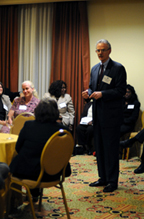In a brief meeting preceding the National Council of Churches’ Centennial Gathering, the NCC’s Governing Board adopted a resolution calling for an end to the war in Afghanistan, and unanimously re-elected the Rev. Michael Kinnamon as NCC general secretary.
The resolution, “A Call to End the War in Afghanistan,” calls upon President Obama to negotiate a withdrawal of U.S. and NATO forces from Afghanistan “to be completed as soon as possible without further endangerment to the lives and welfare of U.S. and NATO troops, Afghan troops and Afghan civilians.”
The board urged the president “to monitor the human rights situation in Afghanistan in the context of the United Nations declaration to use all available diplomatic means to protect the population from crimes against humanity, and to employ military means of protection only as a last resort.”
The board stated deep commitment “that we must reaffirm our witness to Christ’s commandment to love our enemies,” and called upon member communions “to articulate to one another and to government authorities the concept of a ‘Just Peace’ as a proactive strategy for avoiding premature or unnecessary decisions to employ military means of solving conflicts.”
The resolution was adopted by a unanimous voice vote.
Kinnamon, who has served as general secretary since January 2008, was re-elected to a second four-year term beginning January 2012.
Kinnamon is an internationally recognized scholar and leader in the church unity movement. He was general secretary of the Consultation on Church Union, which became Churches Uniting in Christ, from 1999 to 2002. He was executive secretary of the World Council of Churches’ Commission on Faith and Order from 1980 to 1983 and had a major role in drafting the WCC’s major planning document, “Toward a Common Understanding and Vision of the WCC.”
Before assuming his current office at the NCC, Kinnamon was professor of mission, peace and ecumenical studies at Eden Theological Seminary in St. Louis, where he had served since 2000. He was professor of theology and ecumenical studies at Lexington (KY) Theological Seminary from 1988 to 2000 and was dean of the seminary from 1988 to 1998.
In his report to the Governing Board, Kinnamon looked ahead to the Nov. 9-11 Centennial Gathering that commenced immediately following the board meeting.
Kinnamon said it’s right that the gathering meet in New Orleans “where Katrina blew the facade off U.S. public life,” revealing a crumbling infrastructure, enduring racism and the effects of war on national priorities.
Presbyterian minister the Rev. Michael Livingston, former president of the NCC and recently appointed director of the Council’s poverty program, addressed board members and expressed confidence that the member communions will continue their efforts to work together to eradicate poverty.
In other business, the board approved resolutions to merge the U.S. Conference for the World Council of Churches into the NCC.
More than 400 people of faith are gathering here this week in the Marriott New Orleans to celebrate a century of ecumenical engagement and to discuss how the churches might live and work together in an uncertain future.
The Centennial Gathering of the National Council of Churches and Church World Service will mark the one hundredth anniversary of the 1910 World Mission Conference in Edinburgh, Scotland, an event many church historians regard as the beginning of the modern ecumenical movement.
The theme for the Centennial Gathering is “Witnesses of These Things: Ecumenical Engagement in a New Era.” The theme is taken from Luke 24:48 which is the scriptural theme text for the 2010 Week of Prayer for Christian Unity — an additional reminder that there is one, multi-faceted ecumenical movement.

